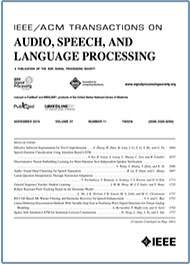- Our Story
- Publications & Resources
- Publications & Resources
- Publications
- IEEE Signal Processing Magazine
- IEEE Journal of Selected Topics in Signal Processing
- IEEE Signal Processing Letters
- IEEE/ACM Transactions on Audio Speech and Language Processing
- IEEE Transactions on Computational Imaging
- IEEE Transactions on Image Processing
- IEEE Transactions on Information Forensics and Security
- IEEE Transactions on Multimedia
- IEEE Transactions on Signal and Information Processing over Networks
- IEEE Transactions on Signal Processing
- IEEE TCI
- IEEE TSIPN
- Data & Challenges
- Submit Manuscript
- Guidelines
- Information for Authors
- Special Issue Deadlines
- Overview Articles
- Top Accessed Articles
- SPS Newsletter
- SigPort
- SPS Resource Center
- Publications Feedback
- Publications FAQ
- Blog
- News
- Dataset Papers
- Conferences & Events
- Community & Involvement
- Professional Development
- For Volunteers
- Information for Authors-OJSP
-
Home
Lectures4 November 2024 to 5 November 2024Conferences Events IEEE JSTSP Article IEEE Signal Processing Magazine IEEE TIFS Article IEEE TMM Article IEEE TSP Article Jobs in Signal Processing Lectures Machine Learning Seasonal Schools Signal Processing News SPM Article SPS Distinguished Lectures SPS Newsletter Article SPS Webinar SPS Webinars SPS Webinar Series Webinar webinars
-
Our Story
What is Signal Processing?

The technology we use, and even rely on, in our everyday lives –computers, radios, video, cell phones – is enabled by signal processing. Learn More » -
Publications & Resources
-
SPS Resources
- Signal Processing Magazine The premier publication of the society.
- SPS Newsletter Monthly updates in Signal Processing
- SPS Resource Center Online library of tutorials, lectures, and presentations.
- SigPort Online repository for reports, papers, and more.
- SPS Feed The latest news, events, and more from the world of Signal Processing.
-
SPS Resources
-
Conferences & Events
-
Community & Involvement
-
Membership
- Join SPS The IEEE Signal Processing Magazine, Conference, Discounts, Awards, Collaborations, and more!
- Chapter Locator Find your local chapter and connect with fellow industry professionals, academics and students
- Women in Signal Processing Networking and engagement opportunities for women across signal processing disciplines
- Students Scholarships, conference discounts, travel grants, SP Cup, VIP Cup, 5-MICC
- Young Professionals Career development opportunities, networking
- Get Involved
-
Technical Committees
- Applied Signal Processing Systems
- Audio and Acoustic Signal Processing
- Bio Imaging and Signal Processing
- Computational Imaging
- Image Video and Multidimensional Signal Processing
- Information Forensics and Security
- Machine Learning for Signal Processing
- Multimedia Signal Processing
- Sensor Array and Multichannel
- Signal Processing for Communication and Networking
- Signal Processing Theory and Methods
- Speech and Language Processing
- Technical Working Groups
- More TC Resources
-
Membership
-
Professional Development
-
Professional Development
- Mentoring Experiences for Underrepresented Young Researchers (ME-UYR)
- Micro Mentoring Experience Program (MiME)
- Distinguished Lecturer Program
- Distinguished Lecturers
- Distinguished Lecturer Nominations
- Past Lecturers
- Distinguished Industry Speaker Program
- Distinguished Industry Speakers
- Distinguished Industry Speaker Nominations
- Industry Resources
- IEEE Training Materials
- Jobs in Signal Processing: IEEE Job Site
-
Career Resources
- SPS Education Program Educational content in signal processing and related fields.
- Distinguished Lecturer Program Chapters have access to educators and authors in the fields of Signal Processing
- PROGRESS Initiative Promoting diversity in the field of signal processing.
- Job Opportunities Signal Processing and Technical Committee specific job opportunities
- Job Submission Form Employers may submit opportunities in the area of Signal Processing.
-
Professional Development
-
For Volunteers
-
For Board & Committee Members
- Board Agenda/Minutes* Agendas, minutes and supporting documentation for Board and Committee Members
- SPS Directory* Directory of volunteers, society and division directory for Board and Committee Members.
- Membership Development Reports* Insight into the Society’s month-over-month and year-over-year growths and declines for Board and Committee Members
-
For Board & Committee Members
Popular Pages
Today's:
- Submit a Manuscript
- Information for Authors
- IEEE Transactions on Image Processing
- IEEE Transactions on Information Forensics and Security
- IEEE Transactions on Multimedia
- IEEE Signal Processing Letters
- IEEE/ACM Transactions on Audio Speech and Language Processing
- 404 Page
- IEEE Transactions on Signal Processing
- Guidelines
- IEEE Journal of Selected Topics in Signal Processing
- Information for Authors-SPL
- (ISBI 2025) 2025 IEEE International Symposium on Biomedical Imaging
- Signal Processing 101
- (ICASSP 2025) 2025 IEEE International Conference on Acoustics, Speech and Signal Processing
All time:
- Information for Authors
- Submit a Manuscript
- IEEE Transactions on Image Processing
- 404 Page
- IEEE/ACM Transactions on Audio Speech and Language Processing
- IEEE Transactions on Information Forensics and Security
- IEEE Transactions on Multimedia
- IEEE Signal Processing Letters
- IEEE Transactions on Signal Processing
- Conferences & Events
- IEEE Journal of Selected Topics in Signal Processing
- Information for Authors-SPL
- Conference Call for Papers
- Signal Processing 101
- IEEE Signal Processing Magazine
Last viewed:
- (SLT 2024) 2024 IEEE Spoken Language Technology Workshop
- Submit a Manuscript
- IEEE Transactions on Signal Processing
- Hamid Krim (NC State University, USA)
- IEEE Transactions on Image Processing
- IEEE SPM Special Issue on Computational MRI: Compressed Sensing and Beyond
- (ICASSP 2024) 2024 IEEE International Conference on Acoustics, Speech and Signal Processing
- IEEE Transactions on Information Forensics and Security
- Guidelines for Associate Editors
- Interspeech 2018 Conference Review
- Acoustic Echo Cancellation Challenge: Datasets and Testing Framework - ICASSP 2021
- (ICASSP 2020) 2020 IEEE International Conference on Acoustics, Speech, and Signal Processing
- IEEE/ACM Transactions on Audio Speech and Language Processing
- Unified EDICS
- SPS Travel Grants
SOLVIT: A Reference-Free Source Localization Technique Using Majorization Minimization
You are here
TASLP Menu
Publications & Resources
- Publications & Resources
- Publications
- Submit a Manuscript
- Editorial Board Nominations
- Challenges & Data Collections
- Publication Guidelines
- Information for Authors
- Special Issue Deadlines
- Overview Articles
- Top Accessed Articles
- SPS Newsletter
- SigPort
- SPS Resource Center
- Publications Feedback
- Publications FAQ
- Blog
- News
For Authors
Top Reasons to Join SPS Today!
1. IEEE Signal Processing Magazine
2. Signal Processing Digital Library*
3. Inside Signal Processing Newsletter
4. SPS Resource Center
5. Career advancement & recognition
6. Discounts on conferences and publications
7. Professional networking
8. Communities for students, young professionals, and women
9. Volunteer opportunities
10. Coming soon! PDH/CEU credits
Click here to learn more.
SOLVIT: A Reference-Free Source Localization Technique Using Majorization Minimization
We consider the problem of localizing the source using range, and range-difference measurements. Both the problems are non-convex, and non-smooth, and are challenging to solve. In this article, we develop an iterative algorithm - Source Localization Via an Iterative technique (SOLVIT) to localize the source using all the distinct range-difference measurements, i.e., without choosing a reference sensor. SOLVIT is based on the Majorization Minimization approach - in which a novel upper bound is formulated, and minimized to get a closed-form solution at every iteration. We also solve the source localization problem based on range measurements, and rederive the Standard Fixed Point algorithm using the Majorization Minimization approach. By doing so, we show a less intricate way to prove the convergence of the Standard Fixed Point algorithm. Numerical simulations, and experiments in an anechoic chamber confirm that SOLVIT performs better than existing reference-based, and reference-free methods in terms of source positioning accuracy.
SPS ON TWITTER
- THIS WEEK: Join NASA’s Dr. Jacqueline Le Moigne as she shares her journey through academia, the private sector, and pivotal roles at NASA, emphasizing her work in signal processing, computer vision, and related technologies. Register now! https://x.com/IEEEsps/status/1785057479606288505
- Join NASA’s Dr. Jacqueline Le Moigne for this interactive webinar as she shares her journey through the realms of signal processing, computer vision, and related technologies, including her pivotal roles at NASA. https://x.com/IEEEsps/status/1782468413551423536
- Great crowd at the Student Job Fair at #ICASSP2024! Thank you to our sponsors for furnishing an exciting, engaging event! https://x.com/IEEEsps/status/1780817453569687559
- Thank you to our Women in Signal Processing Luncheon panelists for their wisdom and insights during today’s event at #ICASSP2024! https://x.com/IEEEsps/status/1780458637338530252
- Free Machine Learning (ML) Lecture Series from IEEE SPS From basics to recent advances, unlock the secrets of ML with Prof. Sergios Theodoridis! https://x.com/IEEEsps/status/1779931297093222415
Home | Sitemap | Contact | Accessibility | Nondiscrimination Policy | IEEE Ethics Reporting | IEEE Privacy Policy | Terms | Feedback
© Copyright 2024 IEEE – All rights reserved. Use of this website signifies your agreement to the IEEE Terms and Conditions.
A not-for-profit organization, IEEE is the world's largest technical professional organization dedicated to advancing technology for the benefit of humanity.











